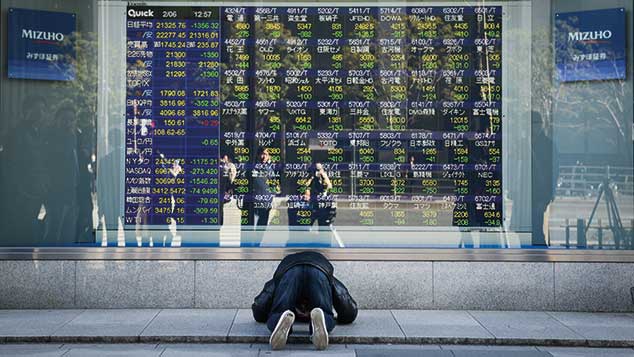
Imagine a child at a birthday party, after too much food, having just “one more cookie and that puts them over the edge”, says David Kelly of JP Morgan Asset Management. Wall Street, having gorged itself on record highs in recent months, has finally suffered a nasty reversal. Last Monday, the benchmark S&P 500 slipped by 4.1% – its worst day in six years. The jitters soon spread to Europe.
Investors have had a fright. As US wages are climbing at an annual rate of 2.9%, which is the highest rate since 2009, it may not be long before inflation rises much faster than its current 2.1% year-on-year pace.
Growth is quickening, with service-sector activity at a 12-year high, so the labour market is set to tighten further. Just wait, says Justin Lahart in The Wall Street Journal, until businesses and consumers start spending their tax-cut windfalls. Meanwhile, solid growth in Europe means interest rates there have nowhere to go but up, albeit very slowly.
Bonds look better now
The return of inflation means the US Federal Reserve may have to raise interest rates faster than investors had expected. For a post-crisis bull market based on “the willingness of central banks to supply copious amounts of money at ultra-low interest rates”, notes Larry Elliott, economics editor at the Guardian, that is not good news.
The prospect of a return of inflation has already led to a sell-off in government bonds and hence to higher yields on these. Since interest rates on company debt use government bond yields as a benchmark, that implies higher borrowing costs for firms. What’s more, if safer bonds offer higher rates “asset managers may think twice about investing in riskier assets” altogether, says Swaha Pattanaik on Breakingviews.
A structural shift
Central banks and investors have grown used to the absence of inflation in the past decade or two, but it may be time for a paradigm shift, says Gavekal Research, an economic analysis firm. Until recently, the emphasis in China had been on generating growth, so it had flooded the global economy with production capacity. No longer.
Now, following last October’s Party Congress, Chinese officials will also be judged on pollution, healthcare, housing and education. Regional prices of natural gas, the cleanest-burning fuel, almost doubled after the policy shift.
Korea and Japan are the other countries that have “generally piled on extra capacity, regardless of that capacity’s return”. However, with the stronger Korean won undermining competitiveness, and Japanese companies increasingly devoted to keeping shareholders happy, that is changing.
Throw in “pedestrian” rates of business investment in the US and Europe, and overcapacity is no longer an issue. As world demand is rising and supply has stopped growing, we should prepare for the return of inflation.